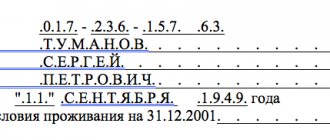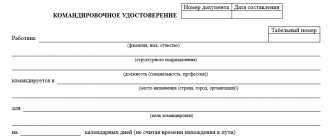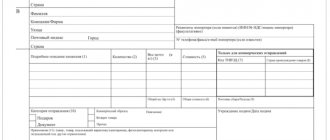What is accounting policy
The term “accounting policy” refers to the methods of maintaining accounting records at an enterprise, including the creation of various types of documentation, the procedure for relations with supervisory and tax authorities, the establishment of internal connections between divisions of the organization in terms of financial interaction, etc.
Accounting policies include a number of local regulations that are developed at the stage of company formation on the basis of relevant legislative norms, regulations and instructions.
Key standards and rules of accounting policies are formed at the federal level and have their own nuances and subtleties depending on the type of activity of enterprises.
In an organization, the accounting policy is usually developed by either the director or the chief accountant, it is approved by a separate order of the manager and only after that it comes into force.
Once approved, it is binding.
How PBU 1/2008 details the process of making changes
PBU 1/2008 “Accounting policies of the organization” (approved by order of the Ministry of Finance of the Russian Federation dated October 6, 2008 No. 106n) explains the algorithms for making changes to the accounting policies in an expanded format - the regulation has a separate chapter for this, establishing:
- reasons for introducing changes (clause 10) - they fully correspond to those listed in art. 8 of Law No. 402-FZ;
- the requirement to justify the changes made (clause 11);
- registration requirements - changes are approved by order or directive of the manager;
- requirement for the date of amendments (clause 12) - it coincides with that specified in clause 7 of Art. 8 of Law No. 402-FZ;
- the requirement for a monetary assessment of the consequences of changes (clause 13) - it refers to changes that can significantly affect the financial position of the organization, the results of its activities and (or) cash flows;
- the need to reflect in accounting the consequences of changes in accounting policies (clauses 14, 15) in one of the specified ways: prospectively or retrospectively;
- scheme for describing in reporting the consequences of applying changes - changes that have had or are capable of having a significant impact on the financial performance of the organization are subject to separate disclosure.
In addition to the above requirements, Ch. III PBU 1/2008 contains important clarifications:
- about which accounting innovations are not considered changes - approval of accounting methods for facts of economic activity that appeared in the organization’s activities for the first time or differ in essence from those that took place previously (paragraph 5, clause 10);
- about when all changes can be reflected in the reporting prospectively - if the organization organizes accounting using simplified methods (clause 15.1).
For information about who is allowed to use simplified accounting, read the article “Features of accounting in small enterprises .
The considered requirements describe algorithms for changing accounting policies. However, they also need to be properly formalized. This is done by drawing up an order that supplements or changes the accounting policy.
Who is required to comply with accounting policies?
The accounting policy must be followed by all organizations registered as legal entities whose responsibility is to maintain accounting records. accounting.
Individual entrepreneurs are exempt from compliance with accounting policies, just like divisions of foreign enterprises - for them there are other regulatory documents.
One important point should be noted: there is no need to confuse accounting (which is determined in accordance with the provisions of the accounting policy) and tax accounting - if there are exceptions for the first, then everyone is required to maintain the second, regardless of the area of work and the taxation system.
Law No. 402-FZ on changes in accounting policies
The Law “On Accounting” dated December 6, 2011 No. 402-FZ lists a closed list of conditions under which changes may be made to the current accounting policy (clause 6 of Article 8):
- the emergence of new requirements in accounting legislation;
- introduction by a business entity of changed accounting algorithms into its accounting process;
- radical changes in the activities of companies, significantly adjusting the conditions of their work.
Clause 7 art. 8 of this law defines additional important aspects:
- the calendar limit for introducing adjustments into the accounting process is from the beginning of the reporting year;
- the purpose of establishing this time limit is to ensure comparability of accounting records;
- an exception to the established rule - the introduction of innovations into the accounting process is carried out from a different date, if this is due to the reason for the change.
How to change accounting policy
Accounting policy is a system of rules chosen at a time for a long time.
It comes into effect at the beginning of each calendar year.
Changes to it during the reporting period can only be made in extreme cases, for example:
- when this is required to provide the most truthful information about the accounting object;
- when editing the law on accounting policies;
- when the enterprise itself changes its direction of activity.
In order to make the necessary amendments or additions to the accounting policy, the organization must issue a corresponding order.
How to reflect changes in accounting policies in accounting statements
Reflect all significant changes in the financial statements. To do this, write an explanatory note. Clause 21 PBU 1/2008 contains a list of information that needs to be reflected:
- reason for change;
- nature of changes;
- how changes are reflected in the reporting;
- the amount of adjustments as a result of changes in the CP.
If the policy has been revised due to legal requirements, then the consequences must be disclosed as specified in the relevant law.
Who signs the document
Regardless of who exactly forms the order, the document must be signed by the highest official of the enterprise - the director or an employee temporarily in his place.
This is due to the fact that all orders are always issued on behalf of the chief executive of the company - this is established by law, i.e. Without his signature, the document will not be considered valid.
In addition, all employees indicated in it, as well as those who are obliged to monitor its implementation, must sign the order. Thus, all these persons indicate that they have read the order and are ready to carry it out.
We formalize changes to the accounting policy (sample)
The need to make changes may arise not only in relation to accounting, but also in relation to tax accounting policies. The conditions under which changes are made to the tax accounting policy are specified in paragraph. 6 tbsp. 313 of the Tax Code of the Russian Federation, they are identical to the accounting standards described above.
Read about how tax accounting is organized and how it differs from accounting.
Let's look at how to formalize changes in an organization's accounting policies using an example.
Example
applies the accounting policy approved by Order No. 412/U dated December 28, 2018. According to clause 5.8 of the accounting policy, the tax method used for calculating depreciation of fixed assets is linear. According to a management decision made in October 2020, the depreciation method is planned to be replaced with a non-linear one.
When formalizing the changes, the following organizational and methodological aspects were taken into account:
- Changes to the accounting policy are introduced from 01/01/2020 - this rule is established in Art. 313 of the Tax Code of the Russian Federation for changes made by the taxpayer not in connection with changes in legislation, but because of a decision made by the taxpayer himself;
- the introduction of a new “depreciation” method is carried out by issuing an order signed by the general director of Mir LLC;
- As preliminary measures to prepare for the transition to a new accounting method, total balances were calculated for each depreciation group, registers for accrued depreciation were developed, and the period for using this method was determined, taking into account the restrictions established by the Tax Code of the Russian Federation.
You can see a sample order for amending the accounting policy on our website.
To learn about what other types of accounting policies may need to be amended, read the articles:
- “Accounting policies for management accounting purposes”;
- “Accounting policies in IFRS format - main provisions”.
By 2019, it is necessary to adjust accounting policies in accordance with new standards
News and analytics News By 2020, it is necessary to adjust the accounting policies in accordance with new standards.
Starting next year, institutions are required to publish their accounting policies on their websites and disclose their provisions in detail in their reporting (clause 9 of Order of the Ministry of Finance of Russia dated December 30, 2020 No. 274n, hereinafter referred to as Order No. 274n).
And in some cases, when accounting policies change, it will be necessary to revise the comparative reporting indicators of previous years (clause 17 of Order No. 274n).
So, in the near future, both the accounting policy itself and each of its changes will become the object of close attention from the founding bodies and financial control authorities (letter of the Ministry of Finance of Russia dated August 31, 2020 No. 02-06-07/62480).
In their method recommendations, specialists from the Russian Ministry of Finance draw attention to the key innovations provided for by the GHS “Accounting Policies, Estimates and Errors”:
1. It is still possible to change the accounting policy (AP) only in 3 cases provided for in Part 6 of Art. 8 of the Federal Law of December 6, 2011 No. 402-FZ “On Accounting” (hereinafter referred to as the Law on Accounting):
- changes in legal requirements or standards;
- development and selection of a new accounting method to improve the quality of accounting information;
- a significant change in the operating conditions of the institution.
2. Prepare and apply accounting policies as follows:
| How to use | How to register |
| Apply the UE consistently from year to year (Part 5 of Article 8 of the Accounting Law). |
|
| Changes to the UE are made from the beginning of the reporting year (Part 7, Article 8 of the Accounting Law). Application of changes not from the beginning of the year may be due to the reason for the change. Coordinate this with the founding body and financial authority. | Starting from 2020, it is better to draw up a separate order to amend the accounting policies. The fact is that for each change, auditors will check: was it necessary to recalculate the indicators for previous years or could the innovation be applied from the date of change in the CP? |
3. Changes and additions to accounting policies can be applied prospectively (clause 6 of Order No. 274n), that is, applied to transactions after the date of change/addition:
| Reason for future use | Examples and recommendations |
| Changes to the CP do not significantly affect reporting indicators (clause 17 of Order No. 274n). | What is considered insignificant, write to the UP. For example, if comparative figures change by more than 5%. |
| Recalculation is not provided for by the regulations on the basis of which the UE is changed (clause 16 of Order No. 274n). | When implementing the GHS “Fixed Assets”, recalculation of depreciation for previous years is not provided:
|
It is not possible to recalculate comparative figures for the previous period:
| A new formula for calculating reserves has been introduced, but personnel records documents were lost in a fire. |
| The addition of the UE does not in any way affect the reporting indicators. |
|
| The UE has been supplemented with a new method for accounting for transactions that did not exist before (clause 14 of Order No. 274n). | A method was introduced to take into account accumulated depreciation during revaluation, but revaluation has not yet taken place. |
| A change in circumstances - a transition to another method is due to the new nature of the facts of economic life. |
|
4. Changes in accounting policies must be applied retrospectively (clause 6 of Order No. 274n), that is, comparative indicators of reports for previous years must be recalculated:
| Reason for retrospective application | Examples and recommendations |
| Changes in the CP significantly affect reporting indicators (clause 17 of Order No. 274n). |
|
| The recalculation is provided for by the regulations on the basis of which the UE is changed (clause 16 of Order No. 274n). | – |
5. Make a retrospective calculation like this:
| Step | What to do |
| 1 | In the year of change in the UE, issue an Accounting Certificate (form 0504833). Make entries for changes in comparative indicators and balances using the debit/credit of account 401 30:
It is as if the new accounting policy had always been applied! |
| 2 | Complete Information on changes in balance sheet currency (forms 0503173, 0503773). We indicate the basis: “recalculated due to a change in the UE.” |
| 3 | We change the opening balances in the Balance Sheet (forms 0503130, 0503730) and other reporting forms of the current year, including explanatory note tables. We disclose the changed comparative indicators in the current year’s reporting. We do not redo the reporting for previous years! |
| 4 | We describe the consequences of changing the UE in the text part and Information about the features of accounting (Table No. 4) of the Explanatory Note (forms 0503160, 0503760) or in the accompanying document with explanations. We answer the questions in these documents: Why did they change (justification)? What is the point (content) changes? From what date do we use the new method? |
Source: https://www.garant.ru/news/1223904/
Accounting policies for 2020 for government institutions: with applications
The accounting policy of a government institution for 2020 is a mandatory document. Now, in order to prepare accounting policies, the government agency will have to study the standards. Look at what operations should be in the document. For a sample for budget accounting and an example of an accounting policy with applications for tax accounting, see the article.
What to change in the accounting policy for 2020 >>>
Who should be entrusted with drawing up accounting policies in a government institution?
In a government institution, the head is responsible for organizing records and maintaining documentation (Article 7 of the Federal Law of December 6, 2011 No. 402-FZ). He also decides who will keep records.
As a rule, government agencies maintain accounting and tax records independently. The accounting department develops accounting policies. But it is not prohibited to involve third-party specialists. If accounting is entrusted to centralized accounting, the contract must specify the responsibilities of the executor for the development and application of the policy.
The head of the government institution approves the accounting policy and is responsible for its implementation. An order to approve the accounting policy should be issued no later than the last working day of the outgoing year. That is, the accounting policy of a government institution for 2020 with appendices must be approved no later than December 30, 2019.
| Subscribe to our channel in Yandex.Zen |
How often to draw up accounting policies
It is not necessary to develop a sample accounting policy for a government institution every year. It is enough to do this once and then make changes. Changes to the accounting policy can be made in two cases:
- decided to change the previously chosen accounting method;
- The current legislation on taxes and fees is changing.
To do this you need:
- prepare the text of changes or additions with their justification;
- determine the effective date of the changes (for example, January 1 of the following year);
- check whether restrictions are observed that are associated with the duration of application of certain tax accounting methods (an institution must apply some methods, without changing, for several tax periods);
- approve changes or additions to the accounting policy by order of the manager.
According to the rules, the accounting policy must consist of at least eight sections (clause 9 of the “Accounting Policies” standard, clause 6 of Instruction No. 157n).
In your accounting policies for accounting purposes, include:
1. Working chart of accounts, where you can write down:
- 26-digit accounting account numbers that the institution uses in accounting;
- accounting account codes and rules on how to generate account numbers.
Also, in the working chart of accounts, secure the analytical codes and accounts that you entered yourself. Experts from the Glavbukh System spoke about how to change accounting policies.
2. Methods for assessing certain types of property and liabilities. Also write down the procedure for registering or registering the disposal of objects, and disclosing information about this in the financial statements.
3. Rules for document flow and technology for processing accounting information, including the procedure and timing for the transfer of primary accounting (consolidated) documents according to the document flow schedule or the procedure for interaction of structural units and responsible persons. If accounting is maintained by centralized accounting, additionally specify the technology for presenting and exchanging accounting information.
4. The procedure for recognizing and disclosing events after the reporting date.
5. The procedure for conducting an inventory of assets, liabilities, off-balance sheet property, and other accounting items.
6. Forms of primary documents, accounting registers and other documents for which there are no unified forms. Moreover, such forms must contain all the mandatory details that are listed in paragraph 25 of the GHS “Conceptual Framework for Accounting and Reporting.”
7. The procedure for conducting internal financial control.
8. The procedure for transferring accounting documents when changing the head and chief accountant of the institution.
9. Other solutions that are necessary for organizing and maintaining accounting, as well as reporting. For example, provisions on what reserves to create and methods for accounting for them.
10. Budgetary and autonomous institutions that exercise the powers of the PBS additionally indicate how to maintain budgetary accounting for these operations.
From 2020, formulate accounting policies in accordance with the rules of the GHS “Accounting Policies, Estimates and Errors.” The institution needs to prepare for the next changes in accounting rules. Let's consider what innovations in federal standards, the procedure for applying the BCC and other regulations may affect the accounting policy of a government institution.
In your accounting policies for 2020, take into account the rules of the new federal standards for the public sector.
"Stocks"
(Order of the Ministry of Finance No. 256n dated December 7, 2018). In the accounting policy section for inventory accounting, add:
- unit of inventory accounting in your institution - item item, batch or homogeneous group of inventory. You can set different accounting units for different inventory groups;
- rules for grouping inventories and work in progress for analytical accounting. For example, introducing additional analytics on accounts for different inventory groups;
- rules for clarifying the cost of inventories in transit;
- rules for writing off costs for delivering supplies to recipients if you carry out centralized procurement;
- rules for calculating the cost of services, work, products, if not previously prescribed;
- rules for assessing work in progress at the end of the month;
- At what price do you reflect goods transferred for sale - at the actual cost or at the selling price.
Source: https://www.glavbukh.ru/art/91926-uchetnaya-politika-kazennyh-uchrejdeniy-2020
Legislation regulating accounting has changed
Policy adjustments may be required due to changes in legislation. For example, if the rules governing accounting or tax accounting, federal standards, etc. have changed. In this regard, you need to somehow change the organization of accounting (paragraph 6 of article 313 of the Tax Code of the Russian Federation, paragraph 2 of paragraph 10 of PBU 1/2008 " Accounting policy of the organization"). You can make changes to your accounting policies at any time as you become aware of changes. They will begin to operate in the order specified in the normative act that introduces them (clause 12 of PBU 1/2008).
Note. Accounting policies can be changed due to changes in legislation at any time during the year. Amendments will take effect in the order specified in the document that makes them.
Thus, from July 1, a trade tax is introduced in Moscow (Moscow Law No. 62 dated December 17, 2014). It will be paid by “simplers” who trade through retail facilities (shops, warehouses, etc.) at least once a quarter (clause 1 of Article 412 and Article 413 of the Tax Code of the Russian Federation). The amount of the paid trade fee can be taken into account under the simplified tax system. So, if you apply the simplified tax system with the object income minus expenses, then you have the right to write off the amount of the fee as expenses on the basis of subparagraph 22 of paragraph 1 of Article 346.16 of the Tax Code of the Russian Federation - as expenses for paying taxes and fees. If you work on the simplified tax system with an income object, then you can put the amount of the trade fee as a deduction for the single tax (clause 8 of article 346.21 of the Tax Code of the Russian Federation). However, if you have several types of activities, then you have the right to reduce the base only for those activities in respect of which the fee was paid (letter of the Ministry of Finance of Russia dated March 27, 2015 No. 03-11-11/16902). Accordingly, you need to keep separate records of income and the amount of tax that is paid in respect of the business that is subject to the trade levy. Thus, in connection with these changes, already in June you can prescribe the procedure for separate accounting of income in your accounting policy for tax accounting purposes. We have provided an example of such amendments below.
Results
Current changes to the accounting policy for 2020 can be made due to amendments to legislation that came into force during the year, as well as when the organization has new or substantially different types of activities. Such changes are approved by order (instruction) of the manager, supplementing the accounting policy.
Read more Need advice from a lawyer on labor law
In addition, starting from 2020, changes will need to be made to the accounting policy if the previously used accounting algorithms have been adjusted by law since the beginning of the year or the organization has independently decided to change the accounting rules applied.
Read about changes in tax legislation that need to be reflected in the UP in the “Tax Changes 2019” section.










